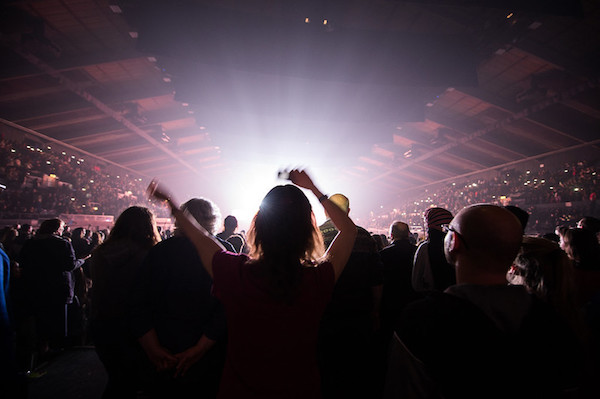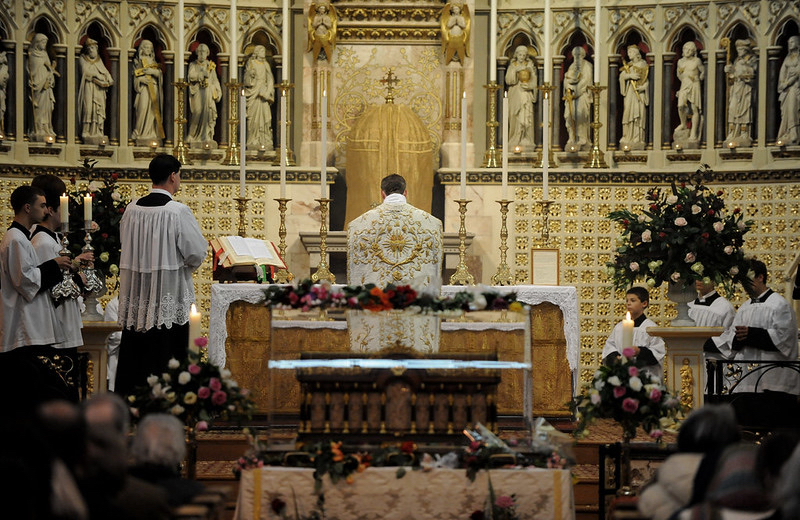Pope Francis has stepped up efforts to implement restrictions on the old rite with a new ruling that tightens the conditions for the celebration of the pre-Second Vatican Council liturgy.
The Pope today confirmed that only the Holy See can give dispensations for old rite Masses to be said in parish churches.
Any priest ordained after 16 July 2021 – the date when the Pope’s restrictions on the older liturgy were issued – must also receive a special licence to celebrate according to the Roman Missal of 1962.
The Pope confirmed the latest measure in a meeting with Cardinal Arthur Roche, the prefect of the Dicastery for Divine Worship, on 20 February.
It follows news that bishops have been granting dispensations for old rite celebrations to continue in parish churches.
Francis issued the ruling Traditionis Custodes, he said, to restore unity to Catholic worship, stressing that the liturgical books that followed the reforms of the Second Vatican Council are the “unique expression” of the liturgy in the Roman Church.
In that legislation, he stated that old rite celebrations could still occur but in locations other than parish churches.
The Pope’s ruling effectively re-imposed restrictions on older forms of the liturgy, which Benedict XVI had lifted in 2007.
Writing to the world’s bishops, Francis said that while his predecessor had tried to recover unity in the Church, his concession had been exploited to “injure the Church, block her path, and expose her to the peril of division”.
The old Rite (or Tridentine Rite, after the Council of Trent which instituted it) requires the priest to say the prayers of the Mass in Latin, often inaudibly, and while facing ad orientem (with his back to the people).
Although many are drawn to its contemplative, otherworldly style, the old rite has also become a rallying point for dissent from the Francis pontificate and opposition to Vatican II.
Several months after the publication of Traditionis Custodes, Cardinal Roche’s office issued an additional set of guidelines responding to questions they had received about implementing Francis’s restrictions.
This document, a “responsa ad dubia” (answers to questions), stated that the cardinal's office was in charge of granting permissions for the old rite to be used in parish churches along with authorising newly ordained priests to celebrate the older liturgy.
Today's rescript also underlines the Pope’s approval of the “responsa ad dubia”, which some had called into question.
Recently, Cardinal Roche has written to bishops saying they cannot use canon 87 of the Code of Canon Law to grant dispensations for pre-Vatican II Masses to be celebrated in parish churches without first seeking permission from the Holy See.
The rescript also says that any bishop who has given a dispensation for Tridentine Masses in parish churches, or who gave permission to a priest ordained after 16 July 2021 to celebrate with the older missal, is now “obliged to inform the Dicastery for Divine Worship and the Discipline of the Sacraments, which will evaluate the individual cases”.
Cardinal Roche, a former Bishop of Leeds and Chairman of ICEL (International Commission on English in the Liturgy), had recently faced criticism from some canon lawyers for allegedly overstepping his authority.
But Professor Ulrich Rhode, the Dean of the Canon Law faculty at the Pontifical Gregorian University in Rome, told The Tablet that there is “sufficient clarity that the bishop cannot grant the dispensation [for celebrations in parish churches] on his own, according to canon 87”.
Professor Rhode made his remarks before the rescript was issued.
Cardinal Roche told the site Where Peter Is that it is an “absurdity to think that the prefect of a dicastery would do anything other than exercise the wishes of the Holy Father”, something that Francis’ latest ruling has confirmed.
The Yorkshire-born prelate was made a cardinal by Francis last August and appointed to lead the liturgy office last May, one of the most sensitive and demanding jobs in the Church’s central government.
Given his close involvement in re-establishing restrictions on old rite celebrations, he has faced persistent attacks from liturgical traditionalists.
According to the constitution for the Roman Curia, Roche’s department is tasked with promoting the “sacred liturgy in accordance with the renewal undertaken by the Second Vatican Council”.
Before receiving his red hat last summer, he pointed out that “the council is the highest legislation that exists in the Church…if you disregard that, you are putting yourself sideways, to the edges of the Church.
“You are becoming more Protestant than you are Catholic.”
In an interview with The Tablet, the cardinal pointed out that Vatican II’s dogmatic constitution on the Church, Lumen Gentium, shifted away from a model of the Church as a “perfect society” to the biblical notion of the Church as the pilgrim People of God.
In the former, he says, it was the priest who “represented the intentions of the people” and took that to God in the liturgy. Vatican II changed that.
“With the understanding of the priesthood of all the baptised it’s not simply the priest alone who celebrates the Eucharist, but all the baptised who celebrate with him,” he said.
“That surely has to be the most profound understanding of what ‘participation’ means.
“That we’re not just reading, we’re not just singing, we’re not just moving things around in the sanctuary or coping with children or whatever it is, but we’re actually entering deeply into the divine life, which has been made manifest to us in the Paschal mystery.”
Several parish churches in England and Wales celebrate the old rite regularly, with the rescript making it clear that bishops will need to seek permission for them to continue.
Joseph Shaw, the Chairman of the Latin Mass Society, described the latest ruling as “grave news” saying that it will lead to an uneven provision of the older liturgy.



 Loading ...
Loading ...